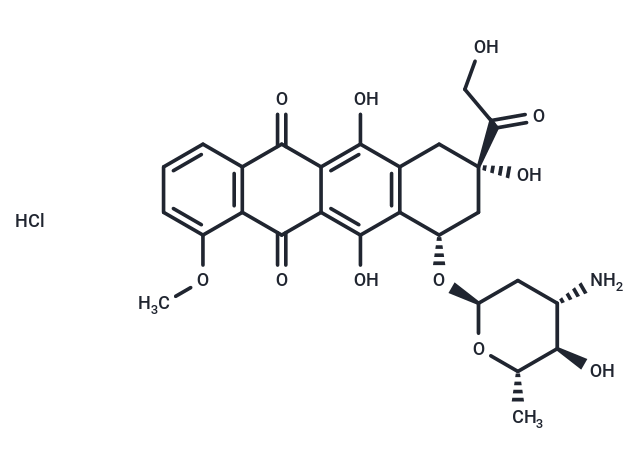Shopping Cart
- Remove All
 Your shopping cart is currently empty
Your shopping cart is currently empty

Epirubicin hydrochloride (Pharmorubicin) is an adriamycin derivative, a topoisomerase (Topo) inhibitor, and a Forkhead box protein p3 (Foxp3) inhibitor. Epirubicin hydrochloride has antitumor activity.

| Pack Size | Price | Availability | Quantity |
|---|---|---|---|
| 2 mg | $33 | In Stock | |
| 5 mg | $51 | In Stock | |
| 10 mg | $81 | In Stock | |
| 25 mg | $153 | In Stock | |
| 50 mg | $252 | In Stock | |
| 100 mg | $342 | In Stock | |
| 500 mg | $827 | In Stock | |
| 1 mL x 10 mM (in DMSO) | $67 | In Stock |
| Description | Epirubicin hydrochloride (Pharmorubicin) is an adriamycin derivative, a topoisomerase (Topo) inhibitor, and a Forkhead box protein p3 (Foxp3) inhibitor. Epirubicin hydrochloride has antitumor activity. |
| In vitro | METHODS: Neuroglioma cells U-87 and neuronal primary cultures were treated with Epirubicin hydrochloride (0.5-100 µM) for 48 h. Cell viability was measured by MTT assay. RESULTS: Epirubicin significantly reduced the viability of rat U-87 cells in a concentration-dependent manner, with an IC50 of 6.3 µM. In contrast to U-87 glioma cells, rat normal neuronal cells were resistant to Epirubicin. [1] METHODS: Human breast cancer cells MDA-MB-231 and SK-BR-3 were treated with Epirubicin hydrochloride (2-3 µM) for 48 h, and apoptosis was detected by Flow cytometry. RESULTS: Epirubicin significantly increased sub-G cells in G2/M block. [2] |
| In vivo | METHODS: To test the antitumor activity in vivo, Epirubicin hydrochloride (7 mg/kg) was administered intravenously three times at four-day intervals to BALB/c nu/nu nude mice bearing MDA-MB-231 xenografts. RESULTS: Epirubicin reduced tumor growth by half and resulted in a more than 10% weight loss. the IR value of Epirubicin at 7 mg/kg was 53.3%. [2] |
| Cell Research | Hep G2 cells (500 cells/well, monolayer) are plated in a 96-well plate. The next day the cells are treated with Epirubicin in the medium. At the end of the incubation periods, 15% volume of MTT dye solution is added. After 1 hr of incubation at 37℃, an equal volume of solubilization/stop solution (dimethylsul-foxide) is added to each well for an additional 1 hr incubation. The absorbance of the reaction solution at 570 nm is recorded.(Only for Reference) |
| Alias | Pharmorubicin, Epirubicin HCl, 4'-Epidoxorubicin hydrochloride, 4'-epidoxorubicin HCl |
| Molecular Weight | 579.98 |
| Formula | C27H30ClNO11 |
| Cas No. | 56390-09-1 |
| Smiles | Cl.COc1cccc2C(=O)c3c(O)c4C[C@](O)(C[C@H](O[C@H]5C[C@H](N)[C@@H](O)[C@H](C)O5)c4c(O)c3C(=O)c12)C(=O)CO |
| Relative Density. | 1.61g/cm3 |
| Storage | store at low temperature,store under nitrogen | Powder: -20°C for 3 years | In solvent: -80°C for 1 year | Shipping with blue ice. | |||||||||||||||||||||||||
| Solubility Information | 5% DMSO+95% Saline: 2.9 mg/mL (5 mM), In vivo: Please add co-solvents sequentially, clarifying the solution as much as possible before adding the next one. Dissolve by heating and/or sonication if necessary. Working solution is recommended to be prepared and used immediately. DMSO: 42.86 mg/mL (73.9 mM), Sonication is recommended. Ethanol: 5.8 mg/mL (10 mM), Sonication is recommended. | |||||||||||||||||||||||||
Solution Preparation Table | ||||||||||||||||||||||||||
Ethanol/DMSO
DMSO
| ||||||||||||||||||||||||||

Copyright © 2015-2025 TargetMol Chemicals Inc. All Rights Reserved.